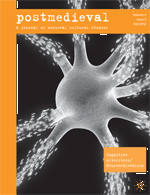
Postmedieval-A Journal of Medieval Cultural Studies
Scope & Guideline
Advancing Understanding of Medieval Dynamics in Today's World
Introduction
Aims and Scopes
- Interdisciplinary Approaches:
The journal encourages the integration of various fields such as literature, history, anthropology, and cultural studies to examine medieval texts and contexts. - Global Perspectives:
It focuses on the global dimensions of medieval studies, addressing how different cultures interacted, influenced one another, and contributed to the medieval experience. - Cultural and Temporal Juxtaposition:
The journal explores the connections between medieval and modern cultures, examining how medieval themes resonate in contemporary contexts. - Ecocritical and Environmental Studies:
There is a significant focus on ecocritical perspectives, analyzing the relationships between medieval cultures and their environments. - Exploration of Marginalized Voices:
The journal highlights underrepresented groups in medieval studies, including Indigenous perspectives and the intersections of race, gender, and sexuality. - Creative and Artistic Expressions:
It also emphasizes the role of creative practices in understanding medieval culture, including dance, performance, and other artistic expressions.
Trending and Emerging
- Indigenous Studies and Medieval Intersections:
The integration of Indigenous studies into medieval scholarship is gaining traction, as seen in recent papers that explore Norse-Saami interactions, emphasizing the importance of diverse cultural narratives. - Ecocriticism and Environmental Humanities:
There is a rising trend in exploring the ecological dimensions of medieval cultures, with increasing interest in how medieval texts and practices relate to environmental issues. - Race, Gender, and Sexuality:
Recent themes reflect a heightened focus on how race, gender, and sexuality are represented and constructed in medieval contexts, challenging traditional narratives and highlighting marginalized voices. - Creative Practices and Performance Studies:
The journal is increasingly publishing works that examine dance, performance, and other creative expressions as vital components of medieval culture, emphasizing their role in understanding historical contexts. - Temporal and Spatial Theories:
Emerging themes include innovative explorations of temporality and spatiality in medieval studies, utilizing concepts like multipolarity and connectivity to analyze historical phenomena.
Declining or Waning
- Traditional Historical Narratives:
There appears to be a decline in strictly historical narratives that do not engage with contemporary issues or interdisciplinary approaches, indicating a shift towards more dynamic and multifaceted interpretations. - Narrowly Defined Geographical Focus:
Papers that focus solely on Western medieval studies without considering global contexts or intercultural dialogues are becoming less frequent. - Static Readings of Canonical Texts:
The journal is moving away from traditional, static analyses of canonical medieval texts, favoring instead more innovative and contextual readings that incorporate modern theoretical frameworks. - Exclusively Textual Analyses:
There is a noticeable decline in papers that focus solely on textual analysis without engaging with material culture or performance studies, reflecting a broader interest in the lived experiences of medieval cultures.
Similar Journals

Zbornik Radova Vizantoloskog Instituta
Exploring the Rich Tapestry of Byzantine StudiesZbornik Radova Vizantoloskog Instituta is a distinguished open-access journal published by the Institute of Byzantine Studies, Serbian Academy of Sciences and Arts, located in Belgrade, Serbia. Since its inception in 2003, this journal has served as a vital platform for the dissemination of scholarly research in the fields of Classics, History, Linguistics and Language, and Literature and Literary Theory. Although it currently holds a Q4 ranking in the 2023 category quartiles, its commitment to fostering academic discourse and research accessibility is unwavering. The journal features a diverse range of articles that explore the complexities and nuances of Byzantine studies and related disciplines, catering to a broad audience of researchers, professionals, and students dedicated to the humanities. With a focus on both historical context and contemporary perspectives, Zbornik Radova Vizantoloskog Instituta aims to contribute significant insights into the academic community while promoting scholarly interaction on a global scale.
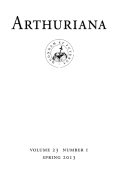
Arthuriana
Advancing the Discourse: A Multidisciplinary Approach to Arthurian StudiesArthuriana is a distinguished journal published by Scriptorium Press, focusing on the rich tapestry of Arthurian studies through a multidisciplinary lens encompassing history, literature, and literary theory. With an ISSN of 1078-6279 and an E-ISSN of 1934-1539, the journal has garnered a commendable reputation, demonstrated by its Category Quartiles ranking—Q2 in History and Q1 in Literature and Literary Theory as of 2023. Covering the period from 2002 to 2024, Arthuriana serves as an essential platform for scholars, offering insights and discourse that enrich our understanding of Arthurian narratives and their cultural significance. Despite its absence of Open Access, it remains vital within the academic community, appealing to researchers, professionals, and students who seek to explore the complexities of this timeless subject. With a Scopus rank of #373 in Literature and Literary Theory and #876 in History, Arthuriana is an indispensable resource for those at the forefront of Arthurian scholarship.
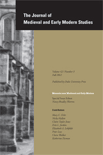
JOURNAL OF MEDIEVAL AND EARLY MODERN STUDIES
Bridging Eras Through Critical ScholarshipThe JOURNAL OF MEDIEVAL AND EARLY MODERN STUDIES, published by DUKE UNIVERSITY PRESS, is a distinguished platform dedicated to exploring the intricacies of medieval and early modern cultures through an interdisciplinary lens. With an ISSN of 1082-9636, this journal has been pivotal in advancing scholarship from 2002 to 2024, providing researchers, professionals, and students with insightful contributions that enhance understanding within the fields of Arts and Humanities and Cultural Studies. With its current standing as Q3 in both category quartiles for 2023 and respectable ranking in Scopus, this publication attracts a diverse readership and stimulates critical conversations about historical narratives and cultural phenomena. Although not an open-access journal, its rich content serves as an invaluable resource for those seeking to delve deeper into the complexities of past societies. The journal’s commitment to excellence in scholarship underscores its vital role in the academic community.
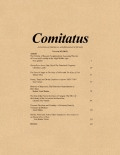
COMITATUS-A JOURNAL OF MEDIEVAL AND RENAISSANCE STUDIES
Reviving History: A Scholarly Journey Through TimeCOMITATUS: A Journal of Medieval and Renaissance Studies, published by the University of California Center for Medieval and Renaissance Studies, serves as a critical platform for exploring the complexities of medieval and Renaissance eras through diverse scholarly lenses. With an ISSN of 0069-6412 and a dedicated E-ISSN of 1557-0290, this journal operates primarily in the United States, delivering rigorous academic discourse aimed at historians, literary critics, and art scholars alike. Although currently classified in the Q4 category within its fields in 2023, including History, Literature and Literary Theory, and Visual Arts and Performing Arts, COMITATUS invites submissions that challenge prevailing narratives and introduce innovative perspectives on cultural phenomena. It has been publishing since 2002 with periods of convergence spanning from 2002 to 2009, and from 2017 to 2023. The journal's commitment to open dialogue and research dissemination makes it an essential resource for students, professionals, and researchers interested in medieval and Renaissance studies, fostering a deeper understanding of these pivotal historical periods.

E-Spania-Revue Electronique d etudes Hispaniques Medievales
Connecting Scholars through Open Access to Hispanic HeritageE-Spania-Revue Electronique d'études Hispaniques Medievales, published by UNIV PARIS IV-PARIS-SORBONNE, is a prominent scholarly journal dedicated to the exploration of medieval Hispanic studies. With its Open Access format established since 2006, the journal facilitates the dissemination of research and critical discourse in the field, creating a vibrant platform for academics, researchers, and students alike. With an ISSN of 1951-6169, this journal aims to foster interdisciplinary dialogue surrounding the rich tapestry of medieval Spanish literature, history, and culture. Situated in the heart of Paris, this journal not only seeks to enhance knowledge production but also encourages collaboration among scholars globally, contributing to the ever-growing landscape of Hispanic studies. Through its commitment to accessibility and scholarly rigor, E-Spania remains an invaluable resource for those invested in understanding the complexities of the medieval Hispanic world.
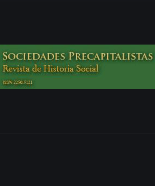
Sociedades Precapitalistas
Bridging Past and Present Through Scholarly InsightSociedades Precapitalistas, published by the Universidad Nacional de La Plata, Faculty of Humanities and Educational Sciences, is a distinguished academic journal that specializes in the study of pre-capitalist societies, exploring their structures, cultures, and dynamics. With an ISSN of 2250-5121 and an E-ISSN of 2250-5121, this Open Access journal has been committed to disseminating knowledge since 2011, ensuring that research is accessible to a global audience. Set in La Plata, Buenos Aires, Argentina, the journal serves as a vital platform for researchers, professionals, and students engaged in this niche yet significant field of study. Although specific impact metrics such as H-Index are currently unavailable, its dedication to academic rigor and the relevance of its subject matter highlight its importance for those exploring the socio-economic histories of societies prior to the capitalist era. As the discourse surrounding global history continues to evolve, Sociedades Precapitalistas plays a crucial role in enriching our understanding of past societies and their legacies.
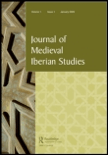
Journal of Medieval Iberian Studies
Exploring the Rich Tapestry of Medieval IberiaThe Journal of Medieval Iberian Studies is a leading academic journal published by Routledge Journals, Taylor & Francis Ltd, dedicated to exploring the diverse and rich tapestry of medieval Iberian history and culture. With its ISSN 1754-6559 and E-ISSN 1754-6567, this journal serves as a vital resource for scholars engaged in the fields of cultural studies and history, attaining a prestigious Q1 ranking in both categories as of 2023. The journal is recognized for its significant contribution to the humanities, featuring peer-reviewed articles that foster innovative research and critical discourse on medieval Iberia from 2010 to 2024. Spanning an array of topics, it encapsulates interdisciplinary approaches to medieval studies, making it an essential publication for researchers, professionals, and students alike who seek to deepen their understanding of this pivotal period in history. Although it currently does not offer open access options, the journal is committed to advancing scholarly discussion and knowledge dissemination within the academic community.

Afghanistan
Exploring the Depths of Afghan Heritage and SocietyAfghanistan, published by Edinburgh University Press, is an insightful academic journal dedicated to exploring the rich and multifaceted dimensions of Afghan culture, history, and socio-political dynamics. This journal, which has been publishing since 2018, serves as a crucial platform for interdisciplinary discourse, contributing significantly to fields such as anthropology, archaeology, classics, history, literature, and religious studies. With notable rankings within the Scopus indices, including a Q2 ranking in Literature and Literary Theory, it highlights the importance of Afghan studies within the global academic landscape. Although it operates without an open access model, the journal maintains rigorous peer-review standards, aiming to foster scholarly dialogue and promote a greater understanding of Afghanistan's unique cultural heritage and contemporary issues. Researchers, professionals, and students alike will find valuable insights within its pages, allowing them to engage critically with the complexities of Afghan society and its contributions to broader human narratives.

Medievalismo
Connecting Scholars through the Lens of the PastMedievalismo is a distinguished academic journal dedicated to the interdisciplinary study of medieval culture, history, and societal influences, published by the esteemed University of Murcia in Spain. Since achieving Open Access in 2010, it has fostered a rich environment for the dissemination of knowledge, encouraging contributions from researchers and scholars across diverse fields. The journal holds a notable Q1 ranking in History and exhibits strong performance metrics in Arts and Humanities and Cultural Studies, as evidenced by its relevant Scopus rankings. With a commitment to promoting high-quality research and discussion, Medievalismo has positioned itself as an essential resource for academics and students aiming to deepen their understanding of the medieval period. Situated in a vibrant scholarly landscape, it continues to publish transformative insights and foster critical dialogue, making significant contributions to the cultural and historical narratives of our time.

CAMBRIAN MEDIEVAL CELTIC STUDIES
Bridging History and Linguistics in Celtic ResearchCambrian Medieval Celtic Studies is a distinguished academic journal dedicated to the exploration and analysis of the rich cultural, historical, and linguistic heritage of the Celtic regions during the medieval period. Published by the Department of Welsh at the University of Aberystwyth in the United Kingdom, this journal serves as a vital platform for scholars and researchers in the fields of archaeology, history, linguistics, and literary studies. With its ISSN 1353-0089, the journal has been operational since 2002, delivering valuable insights and fostering scholarly discourse up to the present, with plans for future publications extending to 2024. Although currently categorized in the Q4 quartile across various relevant fields, Cambrian Medieval Celtic Studies remains committed to enhancing the understanding of medieval Celtic culture through rigorous research and peer-reviewed content. Researchers and students alike will find this journal an essential resource for advancing their studies in these dynamic fields, as it provides open access to a wealth of interdisciplinary perspectives in the arts and humanities.